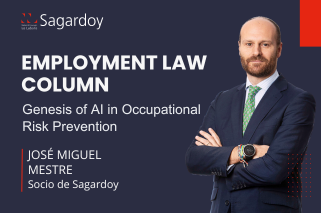October 2025
With only minor variations between different data sources, statistical figures on the current rate of workplace absenteeism in Spain reveal a situation that can only be described as extraordinarily serious.
More than one and a half million employees fail to attend work on a daily basis. The absenteeism rate has comfortably exceeded 7%, and that attributable to temporary incapacity well surpasses 5%, generating an annual cost for companies and the Social Security system exceeding €30 billion, shared almost equally between them. Long-term absences, lasting more than one year, have doubled in less than five years, and the number of employees who have been on sick leave (temporary incapacity) during the same year has also grown exponentially.
Problems are not solved by looking for those to blame, but neither are they solved by doing nothing or denying the reality, as if it would not continue to confirm and worsen the outlook. The persistence of such high absenteeism rates will increase production costs to the point of making a significant number of business projects unviable, particularly among small enterprises. Moreover, it will impose an unbearable cost on both employees and taxpayers—who are, in essence, the same people—with negative consequences for the funding and delivery of other public services.
The diagnosis is hardly disputable, but we must now move forward in the search for solutions, and it is at this stage that opinions begin to diverge. Companies are rightly asking what they can do to improve their situation in the face of this serious problem, and it is our responsibility to help find effective responses.
There are measures that require the intervention of public authorities, and it is necessary to promote a broad social awareness of the pressing need to adopt them. It is widely known that the healthcare system does not always act with sufficient rigour or scrutiny in issuing medical leave and discharge certificates for temporary incapacity. It is also common knowledge that medical leave is often granted quite generously, sometimes upon simple request, especially when the conditions involved are related to mental health—ailments that are difficult to assess without adequate time or resources. The phrase “I’m going to take a sick leave” has become so widespread that it almost implies a unilateral act of will. It is also evident—although there has been slow progress in trauma-related cases—that greater involvement of Mutual Insurance Societies (Mutuas) in monitoring, follow-up, and issuing discharge decisions for temporary incapacity due to common contingencies could accelerate workers’ recovery and shorten the duration of absences in many cases.
However, without substituting for the decisions that belong to public authorities—and which we must continue to demand—companies can also take action within their own sphere of responsibility, at least in certain respects that I would like to briefly highlight.
The first is, possibly, awareness raising, which requires training and information. Those who suffer most from excessively high absenteeism rates are the rest of the employees in the workplace or company, who are forced to multiply their efforts and work under greater pressure due to the prolonged or repeated absence of those who fail to show up. This is an obvious equation, but one that should be explained and emphasised in team meetings, where managers and colleagues can play an important role in conveying this message to unjustified absentees.
The second aspect is the care of the working environment. There is little doubt that a calm, friendly, and flexible work climate reduces absenteeism. It is essential to ensure that employees identify with the company’s purpose, and this cannot be achieved in a toxic environment or through unjustifiably rigid rules that ignore the personal and family needs of those who provide services within an organisation. In this sense, comprehensive wellbeing plans designed to improve workplace welfare are becoming increasingly relevant—viewed not as an expense but as an investment that will have a positive impact on productivity and competitiveness.
The third aspect is sound legal advice. It is true that recent legislative reforms have not made it easier for companies to act against abusive cases of temporary incapacity leave. Nonetheless, there remain avenues for action that can help improve absenteeism rates—from more effective monitoring of absences using the mechanisms still available under Article 20 of the Workers’ Statute, to an in-depth review (and improvement) of collective agreements or company practices concerning the payment of supplementary benefits during periods of temporary incapacity.
For this reason, and in keeping with Sagardoy’s ongoing commitment to staying close to our clients’ needs, I am pleased to announce that this October we have launched a comprehensive advisory and support service for companies seeking to improve their situation regarding absenteeism. This initiative is made possible through a broad collaboration agreement with Q-Ready, a company belonging to the Quirón Salud Group, specialised in improving employees’ health as a means of reducing absenteeism. This is a fully tailor-made service for each company, depending on its specific needs and initial circumstances, and we are confident it will be warmly welcomed by our clients.
I would like to close by wishing everyone good health and enthusiasm to face the final stretch of this year 2025.
Martín Godino Reyes
Managing Partner



